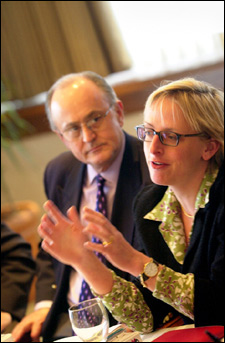Partnerships sought at AIDS conference:
KSG conference first of four to outline business roles in fighting epidemic

Harvard faculty huddled with business, government, and nonprofit representatives last week at the Kennedy School of Government in an effort to forge new partnerships in the global fight against AIDS.
The two-day workshop, “HIV/AIDS and Business in Africa and Asia: Building Sustainable Partnerships,” was an effort to enlist some of the world’s largest companies in the fight against a disease that is ravaging sub-Saharan Africa and which experts say is poised to rampage across Asia.
“AIDS is one of the greatest leadership challenges of our time,” said Peter Piot, executive director of the United Nations Programme on HIV/AIDS. “One of the main lessons we’ve learned in the last 20 years is that governments have a leading role to play but they can’t do it alone. They are doomed to fail.”
Piot, who delivered the workshop’s keynote speech at the ARCO Forum on Feb. 20, said that the fight against AIDS has greater chance of success if the skills and resources of the business community are brought to bear in the battle.
Not only can a company’s core focus – such as pharmaceuticals – help the struggle, Piot said, but their other abilities in distributing products and messages can also be of critical value.
The conference was the first of four planned to enlist corporate support around the world. Future sessions are planned for China in April, South Africa in June, and at Harvard again in September. Companies included in last week’s workshop included some of the world’s largest, such as the Coca-Cola Co., DaimlerChrysler, Exxon Mobil Corp., General Motors, Heineken NV, Pfizer, and Levi Strauss & Co.
Along with those businesses were representatives of several organizations active on the AIDS issue, including the International AIDS Vaccine Initiative, the Network of African People Living with HIV/AIDS, Oxfam, the government of South Africa, the United Kingdom Department for International Development, and the U.S. State Department. Harvard’s Kennedy School, Business School, and School of Public Health, and the Harvard AIDS Institute collaborated as organizers. The workshop was sponsored by Harvard, the United Nations Programme on HIV/AIDS and the World Economic Forum.
The workshop, much of which was conducted in closed-door sessions, was intended to build trust among participants, according to John Ruggie, co-chair of the event and director of the Kennedy School’s Center for Business and Government. He said future sessions in China and in South Africa are intended to address issues and problems specific to those countries before the final wrap-up session at Harvard in September.
The focus on Asia is important, workshop leaders said, because signs point to that region, and particularly India and China, two of the world’s most populous nations, as the next AIDS hot spot. Experts believe that those two countries are showing the same characteristics Africa did 10 or 15 years ago, and that within a decade 100 million people worldwide could be infected with the AIDS virus.
Corporate involvement in the battle against AIDS is not unheard of. Several companies that participated in the workshop have factories and other operations in African nations fighting the disease. Piot said those companies have traditionally provided health clinics for their workers and many are already engaged in the battle against AIDS.
In fact, the point of last week’s workshop was not to convince the attending companies to join in the fight, but to enlist their help to convince others to do so. The companies that attended have already been persuaded to help fight the disease.
“We’re using companies to talk to companies,” Piot said. “We need champions.”
Most of the workshop’s conversation centered on how to reach other companies and on what the proper role of business should be, organizers said. Once an effective strategy has been found, it can be used as an example to encourage others and convince them that they can make a difference.
“The practicalities of how to do this are really tough,” said Kate Taylor, associate director of the World Economic Forum’s Global Health Initiative. “This is a big challenge for business. How can you do so much but not do everything?”




